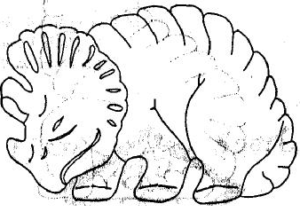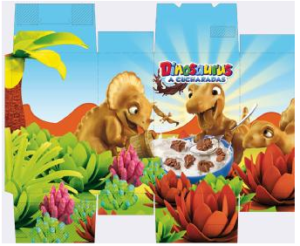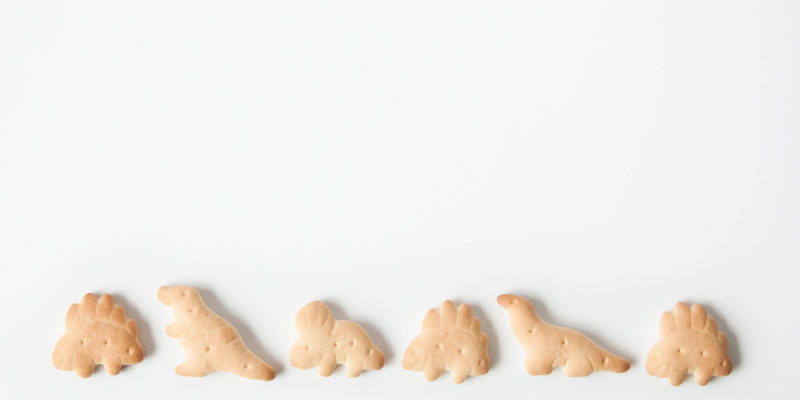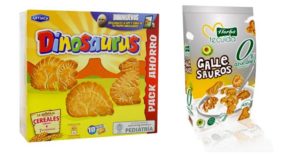Can Dinosaurs be monopolized as a trademark? The Commercial Court of Barcelona (Judgment No. 123/2019 of April 3, 2019) has held that the representation of a dinosaur on a cookie cannot be monopolized by a company and should remain in the public domain.
The famous cookies company GALLETAS ARTIACH S.A.U. (“ARTIACH”) sued LA FLOR BURGALESA S.L. (“FLORBU”) on the basis of trademark infringement and unfair competition. ARTIACH considered that FLORBU had infringed its trademark rights and committed an act of unfair competition by selling cookies in the shape of different dinosaurs.
The plaintiff based its claim on various Spanish trademarks, including (i) the word mark “Dinosaurus” registered for cookies; (ii) figurative marks representing various species of dinosaurs; and (iii) the packaging of the cookies as represented below.
| Spanish trademark no. 2790850 | Spanish trademark no. 1582344 | Spanish trademark no. 3565114 |
| |
 |
 |
The court concluded that there was no trademark infringement as there was no likelihood of confusion. As to the conceptual similarity, the Court found that the shape of a dinosaur cannot be appropriated by a company for cookies. The decision mentioned that ARTIACH did not invoke the protection of three-dimensional trademarks that include specific individualizing elements of dinosaurs but rather a common representation of dinosaurs. However, a similar conclusion would have been reached with a three dimensional trade mark.
The Court also took into account the packaging of the disputed cookies when assessing the likelihood of confusion. ARTIACH cookies are marketed in individual packs, which can be eaten on-the-go, whereas FLORBU cookies are sold in a box, for eating in the home, since they are intended to be eaten as cereals.
The court refers to the CJEU case C 251/95 SABEL BV v Puma AG, Rudolf Dassler Sport, 11 November 1997 to hold that the mere association which the public might make between two trademarks as a result of their analogous semantic content is not in itself a sufficient ground for concluding that there is a likelihood of confusion.
From a procedural standpoint, the court concluded that the claimant attempted to unreasonably introduce an expert report and camouflage it as an expert witness statement. The court conducted a thorough examination of the differences between an expert and an expert witness:
- Fungibility: an expert can be replaced by another with the same knowledge, whereas an expert witness cannot be replaced, because he/she has personal knowledge of the disputed facts;
- An expert witness has a past relationship with the events being judged, whereas an expert is a non-related subject required to evaluate certain aspects of the case;
- An expert witness merely gives a verbal statement during the hearing as to what he/she observed or heard and adds his/her specialized knowledge, “without receiving criticism from other experts, nor criticizing the expert reports issued during the proceedings”;
As a result, the witness proposed by ARTIACH could not give his opinion on the Respondent’s expert report that convinced the Court that there was no likelihood of confusion.
Moreover, the survey submitted by the Claimant was highly criticized by the Court. Several defects were detected: (i) the survey had been conducted online in 2017, when 22% of Spanish households did not have access to the internet, (ii) the survey only covered expensive biscuits and did not represent the Spanish biscuit market, and (iii) the respondents of the survey were minors and the Court considered that the respondents should have been their parents since they are the ones who make the purchase.
This is a relevant decision from three angles: (i) the need to provide a technical expert report to prove the likelihood of confusion instead of a mere expert witness; (ii) the need to conduct the market survey bearing very much in mind the facts of the case; and (iii) even if the claimant’s trademarks had been three-dimensional, the outcome could have been probably the same given the lack of distinctive character of the dinosaurs shape (a similar conclusion was raised in the Oreo decision from the Supreme Court dated 2 September 2015).
_____________________________
To make sure you do not miss out on regular updates from the Kluwer Trademark Blog, please subscribe here.




